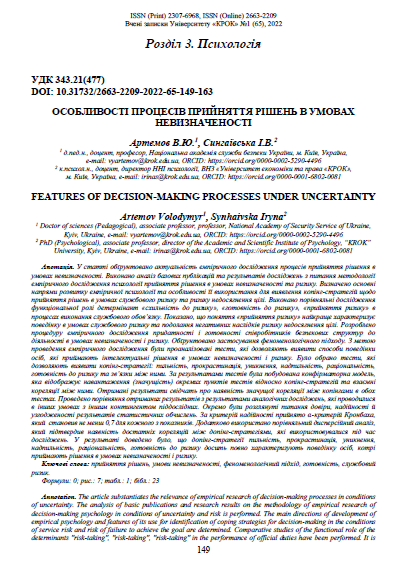FEATURES OF DECISION-MAKING PROCESSES UNDER UNCERTAINTY
DOI:
https://doi.org/10.31732/2663-2209-2022-65-149-163Keywords:
decision making, conditions of uncertainty, phenomenological approach, readiness, on-duty riskAbstract
The article substantiates the relevance of empirical research of decision-making processes in conditions of uncertainty. The analysis of basic publications and research results on the methodology of empirical research of decision-making psychology in conditions of uncertainty and risk is performed. The main directions of development of empirical psychology and features of its use for identification of coping strategies for decision-making in the conditions of service risk and risk of failure to achieve the goal are determined. Comparative studies of the functional role of the determinants "risk-taking", "risk-taking", "risk-taking" in the performance of official duties have been performed. It is shown that the concept of "risk acceptance" best characterizes the behavior in terms of service risk and overcoming the negative consequences of the risk of not achieving the goal. The procedure of empirical research of suitability and readiness of employees of security structures for activity in the conditions of uncertainty and risk is developed. The application of the phenomenological approach is substantiated. In order to conduct empirical research, widely recognized tests have been analyzed to identify behaviors of intellectual decision-makers in conditions of uncertainty and risk. From a large number of tests, MOPR and OFPRO tests were selected as the most satisfactory for the purposes of the empirical study. These tests reveal coping strategies vigilance, procrastination, avoidance, vigilance, rationality, risk appetite and the relationship between them. In the process of empirical research based on the results of tests, a confirmatory model was built, which reflects the load (significance) of individual test items in relation to coping strategies and mutual correlations between them. The results indicate a significant correlation between copings in both tests. The obtained results were compared with the results of similar studies conducted in other conditions with another contingent of subjects. The issues of trust, reliability and consistency of the results of statistical calculations were considered separately. Cronbach's α-test, which was at least 0.7 for each of the indicators, was taken as the reliability criterion. In addition, a comparative analysis of variance was used, which confirmed the existence of sufficient correlations between the coping strategies used in the research. As a result, it was proved that coping strategies vigilance, procrastination, avoidance, vigilance, rationality, willingness to take risks fully characterize the behavior of decision makers in conditions of uncertainty and risk.
Downloads
References
Корнилова Т. В. Психология риска и принятия решений. М.: Аспект Пресс, 2003. 284 с.
Дорфман Л. Я. Методологические основы эмпирической психологии: от понимания к технологии. Москва : Смысл; Издательский центр “Академия”, 2005. 288 с.
Бинсвангер Л. Экзистенциальный анализ / Пер. под ред. С. Римского. М.: Институт Общегуманитарных Исследований, 2014. С. 272.
Купер Д., Робертсон А. Психология в отборе персонала. URL : https://altairbook.com/books/766238403-psihologiya-v-otbore-personala.html.
Лэйнг Р. Я и другие. Узелки / Р.Лейнг. Москва : Эксмо-Пресс, 2002. 304 с.
Мэй Р. Происхождение экзистенциальной психологии. Экзистенциальная психология. Экзистенция. Москва : ЭКСМО Пресс, 2001. 624 с.
Власова О. А. Эрвин Штраус: феноменология сенсорного опыта. URL : https://cyberleninka.ru/article/n/ervin-shtraus-fenomenologiya-sensornogo-opytaния.
Докучаев И. И. Эдмунд Гуссерль: Мыслители прошлого / И.И. Докучаев. Санкт-Петербург: Наука, 2017. 288 с.
Поль Вайнцвайг. Десять заповедей творческой личности / Поль Вайнцвайг. Москва : Прогресс, 1990. 456 с.
Айзенк Г. Парадоксы психологии = Психология - это люди. Москва : Эксмо-Пресс, 2009. 352 с.
Козелецкий Ю. Человек многомерный / Ю. Козелецкий. Киев: Лыбедь, 1991. 239 с.
ДСТУ ISO 9001:2015 (ISO 9001:2015, IDT) Системи управління якістю ВИМОГИ. URL : https://khoda.gov.ua/image/catalog/files/%209001.pdf.
Альгин А. П. Риск и его роль в общественной жизни / А.П. Альгин. Москва : Мысль, 1989. 192 с.
Пугачев В. П. Тесты, деловые игры, тренинги в управлении персоналом. Москва, 2002. 221 с.
Шмелев А. Г. Основы психодиагностики. Москва : Ростов-на-Дону, 1996. 544 с.
Ильин Е.П. Психология риска. СПб: Питер, 2012. 267 с.
Методика: Мельбурнский опросник принятия решений. URL : https://sites.google.com/site/test300m/mopr.
Методика: Личностные факторы принятия решений (ЛФР-25). URL : https://sites.google.com/site/test300m/lfr.
Маслоу А. Мотивация и личность. СПб.: Евразия, 1999. 505 с.
Роджерс К. Р. Взгляд на психотерапию. Становление человека. Москва : «Прогресс», «Универс», 1994. 480 с.
Програмный пакет IBM SPSS Statistics. URL : https://www.ibm.com/ru-ru/analytics/spss-statistics-software.
Толстова Ю. Н. Анализ социологических данных. Методология, дискриптивная статистика, изучение связей между номинальными признаками. Москва : Научный мир, 2000. 380 с.
Вентцель Е. С. Теория вероятностей. Москва. 1969. 560 с.



